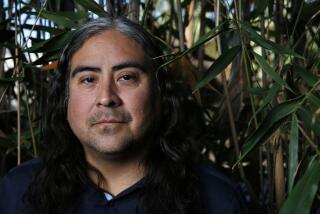Rayner Brown: The Organist/Composer at 78 : Organist/Composer Rayner Brown Is Still Going Strong at 78 : Music: Would people think a composition based on Winnie the Pooh to be silly? The veteran writer couldn’t get the idea out of his head--and the work premieres tonight.
- Share via
A Requiem Mass based on the character of Winnie the Pooh, A. A. Milne’s beloved fictional bear?
Believe it. Such a musical work, written by veteran California composer Rayner Brown, will receive its world premiere tonight at 8 in Pasadena Presbyterian Church, conducted by Edward Low.
Low’s Pasadena Pro Musica ensembles, with baritone soloist Ray Fielder, will give the premiere performance of Brown’s “St. Winfred” Mass. The texts of the Mass, arranged by Brown’s wife, Barbara Patrick Brown, are based on the translations into Latin of the Milne originals, published in 1960.
But composer Brown himself didn’t believe it until he did it.
“I debated a long time before writing this piece,” the composer acknowledged the other day in the comfortable Silver Lake home he and his wife built 35 years ago.
“I kept thinking, ‘is this too frivolous? Will people think it’s silly?’ But I couldn’t get it out of my mind. Finally, I decided to write it for myself and see what happened.”
Barbara Brown’s program note for the piece sums up the couple’s feeling about the new work:
“In ‘St. Winfred’ Mass, Pooh, dearest of all bears, moves through a saintly pattern of innocence, of falling from grace, of joy and of blessing. Respectfully, he is presented and honored as a saint because we all long ago made him one.”
Rayner Brown didn’t know he was a composer until he went to USC in 1930 and, as an organ major, was required to take music theory courses. He found he liked writing music, and two of his teachers, Hanns Eisler and Lucien Caillet, encouraged him to follow his gifts.
Six decades later, Brown is still at it, writing every morning.
“Yes, I write every day,” the 78-year-old--he turns that age today--retired organist says.
“When I stop enjoying composing, I’ll quit. I still like doing it,” he says, adding, “There’s no money in it.”
The much-published, much-recorded composer describes his musical style as “neo-something, I suppose. Neo-Romantic, I guess you would say. It hasn’t changed much, over the years. Always sounds like me.”
It is easy for listeners to form their own opinions. In the next three days, three different Rayner Brown compositions can be heard in Southern California. It’s been like that for a long time.
Tonight is the “St. Winfred” Mass premiere. Sunday afternoon at Victor Valley College in Victorville, Peter Kent and Amy Shulman give the world premiere of Brown’s Concerto for violin and harp, with the High Desert Symphony conducted by Jacob van Velzen.
And Sunday night at 7:30, organist Cherry Rhodes plays the local premiere of Brown’s 20th Organ Sonata at Immanuel Presbyterian Church on Wilshire Boulevard.
The composer’s next project: “Well, I’m writing a piece for organ duet and trumpet, for (organists) Cherry Rhodes and Ladd Thomas. They have played a lot of my music, including a piece for organ duet and two percussionists they presented at the Crystal Cathedral. Also an organ duet and saxophone piece that they gave at Trinity Church in New York City.”
While he waits for the inspiration for his next work, Brown says, “I’ll probably write another organ sonata. That’s what I usually do.”
Does he have ambitions for even larger compositions? An opera, perhaps?
“I’d be glad to write an opera, if I could find a decent script. But isn’t that always the problem? The libretto?”
After retiring as an organist 13 years ago, Brown recently retired from teaching too. He says that composition “can’t be taught, but techniques can. Composers learn to write by writing. There are no shortcuts.
“I believe what Paul Hindemith believed, that the key to composition is visualizing the final work before you start. You can’t proceed if you don’t know where you’re going.”
More to Read
The biggest entertainment stories
Get our big stories about Hollywood, film, television, music, arts, culture and more right in your inbox as soon as they publish.
You may occasionally receive promotional content from the Los Angeles Times.










